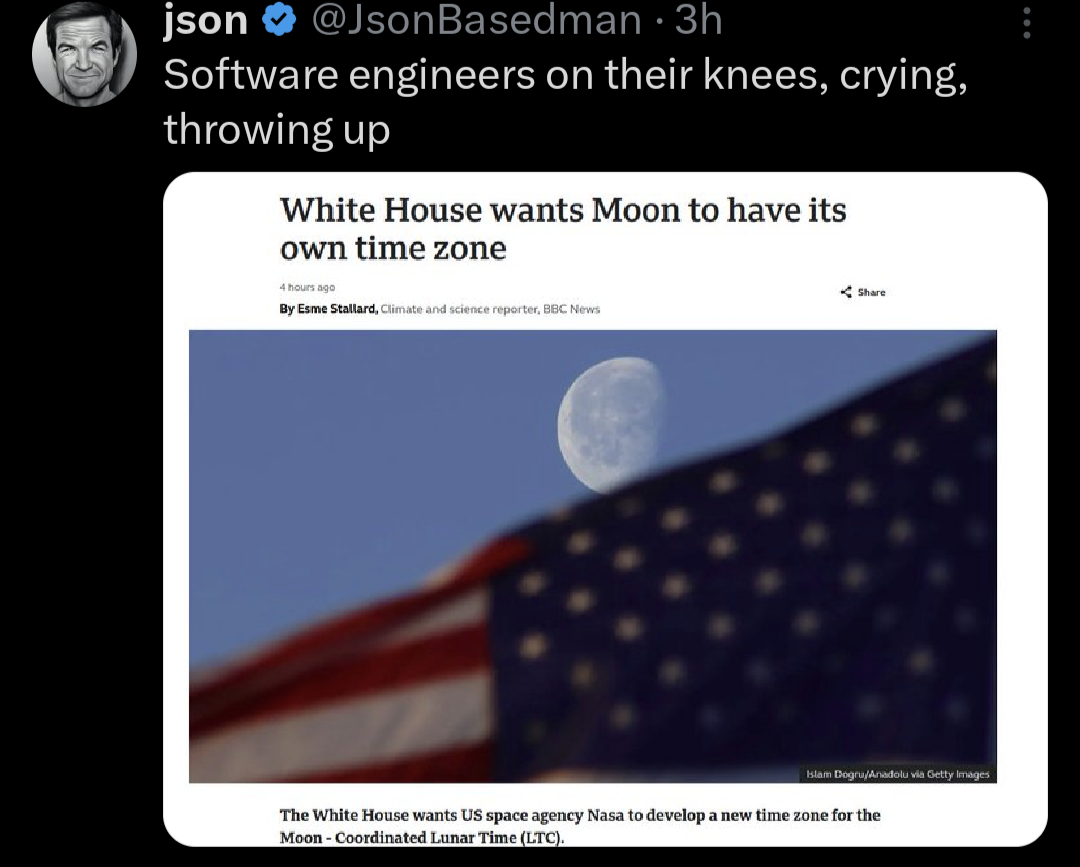this post was submitted on 17 Apr 2024
1453 points (98.6% liked)
Programmer Humor
19965 readers
1233 users here now
Welcome to Programmer Humor!
This is a place where you can post jokes, memes, humor, etc. related to programming!
For sharing awful code theres also Programming Horror.
Rules
- Keep content in english
- No advertisements
- Posts must be related to programming or programmer topics
founded 2 years ago
MODERATORS
you are viewing a single comment's thread
view the rest of the comments
view the rest of the comments

Because the moon is tidally locked to the Earth, some things are quite different up there.
The day/night cycle is a lot longer, from sunrise to sunrise is ~28 Earth days. 14 straight days of sunlight, 14 straight days of darkness. Depending on where you are on the surface, you may never be able to see Earth at all, or if you can it remains more or less fixed in the sky; if you really pay attention it slightly wobbles. The waxing and waning of the Earth's disc are in sync with the sun as well, but not necessarily in phase. For example, if you're on the Moon's meridian, New Earth occurs at noon, but if you're to the East or West it will lag or lead. You can just barely make out major surface features of the Earth enough to tell that the Earth rotates, but at a period that has nothing to do with your local conditions.
There wouldn't really be any utility to dividing the Moon into 24 time zones, it wouldn't line up with anything meaningful on Earth or to human circadian rhythms, so for expeditions like the Apollo program or upcoming Artemis flights, you'd just keep an onboard mission clock for the benefit of the crew and rely on artificial lighting and shades to maintain an Earth-like day/night cycle.
It feels to me like this is a problem that doesn't need to be solved yet if ever; I would wait until there are actual people living on the Moon and let them solve the problem in a way that fits their needs, which we cannot fully anticipate from down here on Earth.
I will note that time zones make more sense on Mars than the Moon. Mars has a rapid day/night cycle fairly similar to Earths, a Martian sol is about a half hour longer than an Earth day, fairly easy for humans to adapt to and live la vida loca. Some humans already have; NASA crews working on our various rovers adjust their working days to their rover's local solar conditions. They wear watches calibrated for Martian sols and the wake up and go to bed at a different Earth time every day so that they can work from the rover's sunrise to sunset, when they have light to see and when Spirit and Opportunity had power to move. And because the rovers are scattered across the surface of Mars, their local sunrises and sunsets happen at different times, so we already have de facto time zones on Mars.
So, there is an actual utility for it, it's just not people centric.
Having a framework for how you convert the clock measurements from the lunar reference frame to terrestrial reference frame is helpful for orbital maneuvering and navigation, as well as communication coordination.
They're not building a "UTC+5” style timezone, but a "given the moons mass and orbit, here's how we define the time ratio between the earth and moon so we can consistently calibrate our clocks".